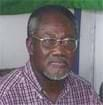Prioritize Millennium Development Goals Website
Leaders who gathered for a progressive governance roundtable in Watford, London on Saturday have called for immediate global action to put the Millennium Development Goals (MDGs) at the forefront of international agenda. They maintained that it was only by recognizing that this was truly an emergency that concerted global action could be brought about. The MDGs, which range from halving extreme poverty, spread of HIV/AIDS and providing universal primary education, all by the target date of 2015, form a blueprint agreed to by all countries and development institutions. The about 20 leaders, in a communiqué, noted with concern that despite pledges to spare no effort at achieving these goals and the unprecedented global wealth, global inequalities had become more acute with some 2.5 billion people still living on less than two dollars a day, while many countries were significantly behind the goals for 2015 in health and child education. Ghana’s President John Agyekum Kufuor, Italian Prime Minister Romano Prodi, Mr Kevin Ruud, Prime Minister of Australia, South African President Thabo Mbeki, Prime Minister of New Zealand, Helen Clark, Chilean President Bachelet Michelle, President Ellen Johnson-Sirleaf of Liberia and Mr Robert Fico of Slovakia, were among those who attended the summit hosted by British Prime Minister Gordon Brown. Also present were former US President Bill Clinton, representatives of international organizations including United Nations, World Bank, International Monetary Fund, African Development Bank, European Union and World Trade Organization. Issues discussed included trade, poverty and development, reform of international institutions and climate change. United by common desires Myjoyonline Ghana News Photos | The MDGs includes providing universal primary education The MDGs includes providing universal primary education United by a common goal of promoting a more inclusive globalization that would engender prosperity for both developed and developing nations, they vowed to work together to help the world get back on track to meet the MDGs. They further highlighted the need for an open global trading environment and vowed to push for a WTO Ministerial meeting in May to agree on modalities for both agriculture and non-agriculture market access and lay the ground for a full deal for the successful conclusion of the Doha Development Agenda by the end of the year. Any deal, they insisted, must include a substantial package of support for the poorest countries including aid for trade, more simplified rules of origin, special and differential treatment and action on specific commodities. Beyond this, there was also the need to think more radically as to how better to integrate into global trading system those countries that global "trade currently passes by." They said it was on the basis of this that support should be given to the African Union's effort to establish African Common Market to boost intra-African trade and to help bring geographically isolated landlocked states more fully into the global trading network. President Kufuor, addressing the opening session, noted that "the global village' was now a reality and for that matter it was important that values and standards should be made the same for all. The progressive alliance or governance should therefore encompass all known blocs, bringing on board countries with much financial muscle like India, China, Russia and the Middle-East nations. Mr Brown said "we have to reshape global rules and global institutions to meet the challenges of this era." Institutions such as the World Bank and UN, he said, needed to be reformed to tackle the double threat of economic turmoil and climate change. The Progressive Movement was initiated by President Clinton in 1999 when he hosted and led a roundtable discussion in Washington with British Prime Minister Tony Blair, German Chancellor Schroeder, Dutch Prime Minister Win Kok and Italian Prime Minister Massimo D' Aleme.
Source: MJFM








